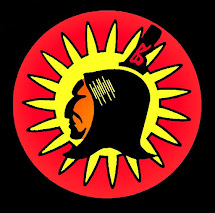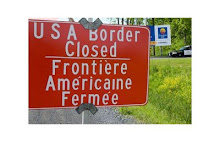Thursday, July 23, 2009
Native to Native Business is Criminalized and Over Regulated by Federal, State and Tribal Governments
The Commerce Clause of the US Constitution states that "The Congress shall have the power to regulate commerce...with Indian Tribes." So even in their law, only Congress has any authority when it comes to Native commerce, not the States. And the "power" the US Constitution provides is only for their commerce with Native people, not the commerce of Native people. So in this alleged era of "Self Determination", why are State and Federal prosecutors constantly charging Native businessmen, seizing accounts and generally interfering with Native to Native commerce? And why have Tribal governments not only complied with so many state and federal commerce laws but in some instances outlawed Native to Native business?
We are often asked by non-native people; why don't Native people work together and become more united? Beyond the role that the diversity of our cultures and geography plays, we also find ourselves all over the map on sovereignty and assimilation into American and Canadian law and governance. Tribal and Band Councils generally exist as extensions of the federal governments and rely on their federal recognition for funding and authority. Rarely will you find a Tribal or Band Council take much of an interest, let alone a position of support in a conflict or issue in another Native community. The People on the other hand quite often are engaged in supporting each other. There is a disconnect between the unity felt by Native people and the tunnel vision of tribal governments. Just as the state/provincial and federal powers try to limit the power of Native people, so do tribal governments. Consolidation of power is a tribal government function. Signature authority, tribal courts, tribal police; these are all about reducing the masses to only a few manageable individuals or institutions for the outside to deal with. Certainly the prospect for US or Canadian officials of dealing with a million individual Indians, who believe they are sovereign, is scary and unacceptable.
So where does this leave us when it comes to Native people trying to forge economic ties with people from other Native communities? Pretty much on our own or worse, fighting our own tribal leaders. In spite of this, it is too important an issue and it must be elevated in our conversations and our development. We must promote and support Native to Native business and condemn, loudly if necessary, all those who work against it. Tribal leaders must be called out on any tribal regulations that obstruct commerce with other Native communities and any collusion with outside authorities to charge or otherwise obstruct our people. Native to Native commerce should be pushed into the conversations in Washington and Ottawa. Obama should be held to all his rhetoric and overtures to Native people about his concern for our well being. The new buzz in Indian Country must become N2N or NDN2NDN commerce.
I will be featuring a series of articles addressing Native to Native commerce. Features will include coverage of prosecutions of Native businessmen, obstacles imposed by state, federal and tribal governments and opportunities that need to be developed.
Subscribe to:
Post Comments (Atom)













![-[]-[]-/\-[]-[]-](https://blogger.googleusercontent.com/img/b/R29vZ2xl/AVvXsEjLoXmKO8PJVQ5pZ2q7GX7nFKw8H2tb28dxt-o10FUBNtOGszWhWoLB7tgjtMgtISpuSxNW3fcDxfuSS2DqojsdjNJ1lVggyUS374PnzsDbOhk4ukvtTunFQcyfkckZeBzcLbri4LDYN_E/s214/29-03-A-voice-from-the-Akw-.jpg)





1 comment:
State and federal authorities can waive fees, abate taxes, create various incentives for this or that and market those regulatory advantages all over the world but every road block imaginable is thrown at Native people when it comes to doing as we have for ten thousand years and that is trade with fellow Native territories. More often than not we are required to use a state or federally licensed individual to conduct even basic N2N business or worse yet, obtain a license. The US and Canada absolutely forbid Native people from dealing directly with Natives outside their borders. Our trade is criminalized and labeled smuggling or illicit. We are illegally taxed, inspected and regulated. There is no basis in any law that provides authority for customs or anyone else to interfere with Native to Native commerce. We must push through the barriers and re-establish our trade routes and our economic relationships.
Post a Comment